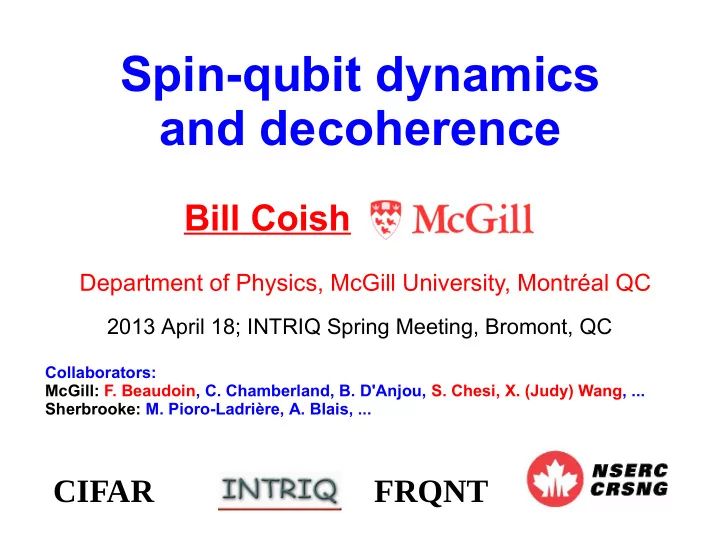

Spin-qubit dynamics and decoherence Bill Coish Department of Physics, McGill University, Montréal QC 2013 April 18; INTRIQ Spring Meeting, Bromont, QC Collaborators: McGill: F. Beaudoin, C. Chamberland, B. D'Anjou, S. Chesi, X. (Judy) Wang, ... Sherbrooke: M. Pioro-Ladrière, A. Blais, ... CIFAR FRQNT
Scalable Platform for QIP?: Single electrons? V(r) r encoding: j"i ! j 0 i j#i ! j 1 i
Other ways of “trapping” spin: Semiconductor quantum dots and defects `Gated' quantum dots Self-assembled quantum dots (electrical control/readout) (optical control/readout) Nitrogen vacancy (NV) Donor impurity spin centers in diamond (electrical control/readout) (optical control/readout)
Scalability: Why electron spins? NMR, Charge, Electrons etc.... Exchange is local Dipolar, Coulomb interactions long-ranged
Problem: One spin sees many Many isotopes have non-zero nuclear spin!
Remove the environmental spins? Silicon Spin of a donor atom in highly pure 28 Si behaves almost like it's in 'vacuum' Lifetime of quantum states (nuclear spins): Avogadro crystal: Highly pure 28 Si M. Steger et al., Science (2012)
A new quantum silicon race? Gated Si quantum dots Si:SiGe nanowire quantum dots (HRL) (Harvard) MOSFET (Sandia/Sherbrooke)
Carbon? 12 C has no nuclear spin nanotubes defects in graphene diamond
“Theory of everything” for spins in the solid state ~ I ~ B + + ~ E ~ S - -
Confined electron
Interactions: s vs. p s-state (electron) p-state (hole) + + Anything else: NV Center, Nanotubes, graphene,...combination
Electron-spin dynamics: A difficult theoretical problem... Longitudinal Transverse fluctuations fluctuations ('flip-flops') nuclei (quantum dot) B
Hole Spins? Heavy holes: [Fischer, WAC, Bulaev, Loss, PRB (2008)] Fluctuations are purely longitudinal
Spin Echo? Time-reversal of static inhomogeneities
Recent Experiments: Hole-spin Echo De Greve et al., Nature Physics (2011) Shorter than for Electrons! BUT : Limited by extrinsic charge noise, not (intrinsic) hyperfine (yet)
Charge noise Dynamics of x-component not limited by charge noise XJ Wang, S Chesi, WAC, PRL (2012)
Hole-spin dynamics: Exact solution (2D, No strain) Exact analytical solution (messy formula): 1 ¿ / p Decay time decreases for increasing B B (dynamics not refocused)
Exact solution: Larger B
Exact solution: Recurrences (“ESEEM”) Amplitude: Motional Averaging!
Method 2: Magnus expansion : : :
Closed-form spin dynamics nuclear spins Gaussian approximation (Magnus) Short time: XJ Wang, S Chesi, WAC, Phys. Rev. Lett. (2012)
Magnus expansion: Spin echoes in a dynamic environment B = 0 : 5 T N = 2000 nuclei Magnus (dashed red) Exact (solid blue)
Hole spin summary 1/e Decay time XJ Wang, S Chesi, WAC, Phys. Rev. Lett. (2012)
Magnetic-field gradient: Why? Idea 1) Move spin periodically using an electric field in presence of slanting Zeeman field; get an ac magnetic field in the rest frame of the electron. Tokura et al., PRL (2006) Pioro-Ladrière et al., Nat. Phys. (2008) Idea 2) Couple single spin to the electric-field mode of a stripline resonator Pioro-Ladrière group (Sherbrooke)
Coherence decay with B-field gradient Single donor spin: Breakdown of Gaussian approximation
Conclusions Hole spins are robust 'new' qubits? Only a matter of better decoupling/higher B-fields? Magnetic-field gradients may lead to shorter coherence times, but can be controlled with motional averaging.
Recommend
More recommend